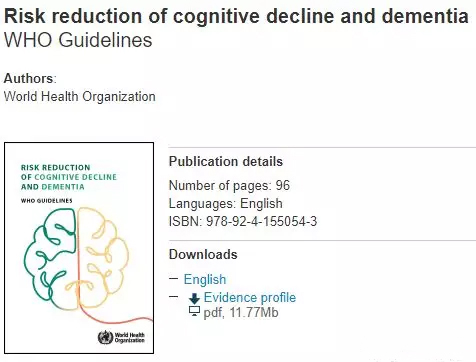WHO releases latest dementia prevention guidelines, assessing 12 risk factors
2019-05-29 14:16:36
Currently, up to 50 million people worldwide suffer from dementia, a group of neurodegenerative diseases that cause memory loss. When dementia becomes severe enough, it can impair a person's ability to carry out daily tasks. Despite the fact that dementia changes the lives of so many people and their families around the world, scientists have yet to pinpoint the exact cause of the condition. While there is currently no cure for dementia, many studies have shown that risk factors influence the development of the disease.
Some of these factors are lifestyle-related and can be modified. So, with enough information, people may be able to learn how to adjust their lifestyles to be healthier and reduce their risk of developing a variety of diseases, including dementia.
Last week, WHO released a new set of dementia prevention guidelines, designed to advise governments, policymakers and health care providers on how to better deal with dementia.

The guideline development process followed the WHO Manual for Guideline Development, reviewed the existing evidence on the most important lifestyle-related risk factors for dementia, and took these factors into account when issuing prevention recommendations.
WHO aims to provide advice to health care workers around the world, but also hopes that the guidelines can provide a reliable source of information for government organizations to help them develop better prevention and care policies.
"The number of people with dementia is expected to triple over the next 30 years. We need to do everything we can to reduce the risk of dementia. The scientific evidence gathered to develop these guidelines confirms what we have long suspected: that what is good for our hearts is also good for our brains," said Dr. Tedros Adhanom Ghebreyesus, WHO Director-General.
In these new guidelines, WHO assesses 12 risk factors for dementia and provides advice on how to address each one.
These possible risk factors include: insufficient physical activity, smoking, poor diet, alcohol consumption, cognitive impairment (the brain's ability to compensate for neurological problems), lack of social interaction, unhealthy weight, high blood pressure, diabetes, dyslipidemia (unhealthy cholesterol levels), depression and hearing loss.
While the WHO used these guidelines primarily to make recommendations on how to address these potential factors, they also considered whether there was enough strong evidence to show that addressing these risk factors would help prevent dementia.
In doing so, they found moderate evidence to support the view that being more physically active and following a Mediterranean diet can be protective against cognitive decline. Reducing alcohol intake can also do the same.
Currently, there is insufficient evidence to suggest that increasing social activities, taking antidepressants or using hearing aids can reduce the risk of dementia. However, the WHO stressed that engaging in social activities, actively treating depression and managing hearing loss are very important.
The WHO official document states: "The existence of potentially modifiable risk factors suggests that dementia prevention is possible through a public health approach, including key interventions to slow cognitive decline or dementia."
The WHO's action plan to improve global health has given dementia control a very high priority. The action plan aims to improve the lives of people with dementia, their caregivers, and their families, while reducing the impact of dementia on people, societies and countries.



